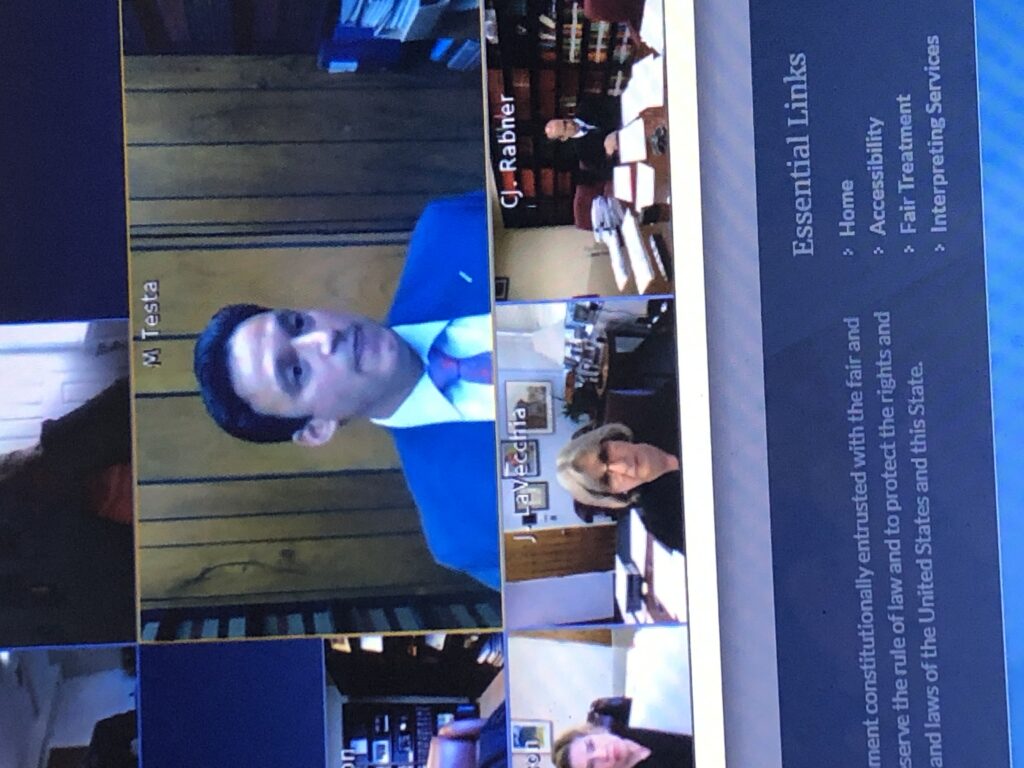Testa and Company go for Broke on Murphy's Borrowing Plan

Republican state Sen. Mike Testa was on a roll, condemning Phil Murphy's nearly $10 billion borrowing plan for skirting voter approval, improperly treating borrowed funds as real revenue and not precisely saying how the money would be spent.
But then he was stopped by Chief Justice Stuart Rabner.
"In February, one could not foresee the consequences of the COVID 19 pandemic," Rabner said during Wednesday's New Jersey Supreme Court hearing via Zoom.
But now, Rabner observed, we know that the virus has killed thousands and will likely kill many more.
That quickly got to the core of a case centering on a Republican challenge to the Democratic-Legislature's support of a plan to borrow $9.9 billion to meet state expenses during a pandemic.
In simple terms - when there is a genuine emergency, doesn't the state have to do all it can to cope?
Testa agreed that COVID 19 is a real emergency.
But he said state revenue problems are not an emergency. Instead of borrowing money, Testa said the governor has other means at his disposal, namely "belt-tightening" and the impounding of funds.
The justices seemed a bit puzzled by this.
Justice Barry Albin suggested that the health emergency is causing the fiscal and economic crisis that the state now faces. So, under this interpretation, isn't there an obvious link between the virus and the state's planned borrowing? And to stress how bad things are, Albin brought up the fact close to a million people have filed for unemployment insurance and plummeting tax revenue.
Testa wasn't sure.
He acknowledged a legitimate public health emergency, but said that in itself doesn't extend to a fiscal emergency requiring the borrowing of billions of dollars. The Murphy administration, he said, hasn't even identified what the shortfall in the budget precisely is.
That drew a favorable response from Justice Faustino Fernandez-Vina who wondered if the bonding was "premature," a point to which Testa readily agreed.
Legal arguments aside, the politics here is rich.
Besides Testa, a rising Republican star, another GOP plaintiff in the case is Jack Ciattarelli, who is running for governor next year.
Lawyer Mark Sheridan argued the case for Ciattarelli and got into his own verbal exchange with Albin, one of the court's most liberal justices.
One of the constitutional arguments the plaintiffs are making has to do with anticipated and unanticipated costs. Under this train of thought, borrowing is permitted for unanticipated costs in an emergency, but not anticipated ones.
This can be a pretty abstract distinction. Another problem is that it's hard to anticipate a pandemic.
Responding, Albin reached back to the bombing of London during World War II. He said the residents of London at the time anticipated bombings every night, but that didn't make the attacks any less of a disaster or emergency. In other words, he considered the distinction meaningless.
History, in fact, had a starring role throughout the more than two-hour hearing.
Jean Reilly, a Deputy Attorney General who argued the case for the administration, said there is precedent for just about unlimited state borrowing without voter approval in emergencies. She mentioned the Civil War and the Great Depression.
The justices didn't necessarily question that, but they were interested in how the state plans to spend the billions it wants to borrow.
On that, Reilly was a bit vague.
Rabner asked if the money could be used to build a new sports arena? He was being facetious - maybe.
Reilly said no, but a few minutes later, citing the WPA and the Great Depression, she suggested that might be possible.
Justice Lee Solomon seemed most exasperated by this, saying the spending specifics should be in the bond act. He noted that the state wants $9.9 billion without saying how it would be spent. And isn't that what the constitution prevents, he asked.
"Go to the voters," he said. "I'm sure it passes."
Judge Jaynee LaVecchia seemed to concur, saying that even during the Great Depression, the state presented general reasons for borrowing money such as unemployment relief and schools.
Reilly countered that the state must have "flexibility" in dealing with an emergency, especially one that covers both the real and fiscal health of society. She said deciding exactly how the money is spent should be left to the Legislature, which she noted, is answerable to the public.
Nonetheless, Rabner tried again.
He wanted to know if there are any expenses that would not be required by the pandemic.
"I'm sure there must be some," Reilly said. "There probably are some on the margins."






We all know Damn right that this should be Voted on By The People !! Fat chance those liberals will stop It. If you can, Move from nj ( small caps to show disrespect ) if you Can. See how long before they Move also!